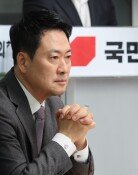Unification Ministry Evaluates Sunshine Policy
Unification Ministry Evaluates Sunshine Policy
Posted January. 24, 2008 08:52,
The Unification Ministry has launched its first official evaluation of the results of the engagement policy towards North Korea, better known as the sunshine policy.
The ministry acknowledged Tuesday that the Kim Dae-jung and Roh Moo-hyun administrations unilaterally pushed for aid to North Korea without public consensus, and is planning to propose alternative policies to the new administration.
We will conduct a comprehensive evaluation to assess how effective the engagement policy towards the North has been over the past 10 years in easing tension and changing the communist regime for peaceful unification of the Korean Peninsula, and if each policy was properly carried out, a ministry official said.
The ministry openly admits to failing to maintain a balance and being extremely one-sided in the process of implementing policies. It will draw up complementary or improvement measures.
The evaluation will also disclose positive achievements of the policy unknown to the public or misunderstood, through objective and scientific data.
The past two administrations have pushed the engagement policy, a taboo subject for criticism or assessment by public officials. Thus evaluations on certain projects have been mostly fragmentary or heavily promotional.
The ministry is evaluating general issues constantly drawing media criticism, such as problems in implementing policies and the degree of achieving policy objectives. Also under the microscope are specific business areas, inter-Korean negotiations, the management of the Inter-Korean Cooperation Fund and bilateral economic projects.
The ministry will develop quantitative indexes used in public relations, such as the number of separated family members in inter-Korean reunions, the amount of money used in inter-Korean economic cooperation, and the number of South Koreans visiting Mount Geumgang, the ministry official said.
The ministry will also develop qualitative indexes employing in-depth interviews for an assessment based on an objective and critical analysis framework.
Many ministry staff said their chief tarnished the positive achievements of the engagement approach with comments and policies overlooking reality and public opinion, in a desperate attempt not to oppose the presidents view.
The evaluation will be completed before President-elect Lee Myung-bak takes office on Feb. 25, and will be briefed to the president and the Cabinet. The ministry briefed the presidential transition committee on Jan. 7 on improving policy toward North Korea.
kyle@donga.com



![“잠만 자면 입이 바싹바싹”…잠들기 전에 이것 체크해야 [알쓸톡]](https://dimg.donga.com/c/138/175/90/1/wps/NEWS/IMAGE/2026/02/23/133404749.3.jpg)



